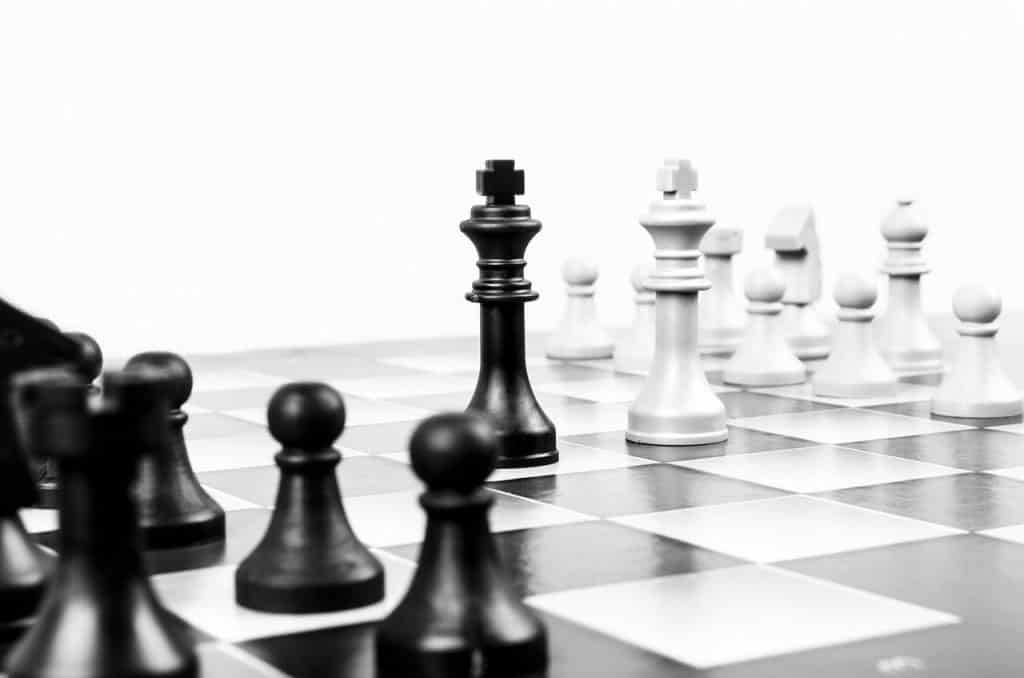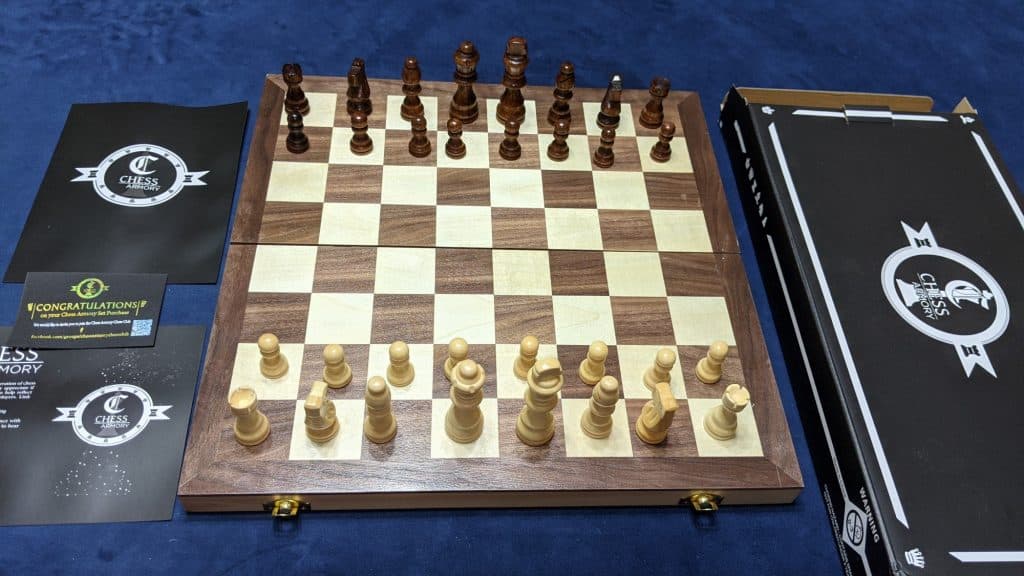Chess is a wonderful classic game of strategy. For many of us, this was the game that made us fall deeply in love with more in-depth strategy games and one that many of us learned from a parent as young children. To this day I’m a firm believer that few things beat a truly good game of chess.
One of the beauties of chess is the incredible level and layers of strategy from a base game that is relatively simple in setup and function. You can learn chess at a very young age and get all the movements down. But mastering the game can take a lifetime, and meeting incredibly skilled players who can challenge you and stretch your chess playing skills is always a thrill. As well as the gift that keeps on giving to the chess enthusiast – no matter what level of skill.
An illegal move in chess is any move against FIDE laws of chess. There are currently eight illegal moves in chess with the four most common being: moving to space another piece of yours already holds, using the wrong movement for a piece, castling at an inappropriate/illegal time, or any move that puts your king into check.
If you avoid these four illegal moves, you’ll avoid 99% of potential problems. All other illegal moves as defined by the World Chess Federation (FIDE – the official name is in another language).

Most illegal moves are pretty basic in nature. Once you understand the basic rules of chess you understand how to avoid any moves that would not be considered legal in nature.
Full List of Illegal Moves in Chess
- Using the wrong movement for a piece (moving a bishop like a rook or a queen like a knight, for example)
- Moving to a space already held by a piece of yours (same color)
- Moving to a space occupied by an opponent and not removing the captured chess piece
- “Passing over” pieces with a bishop, rook, or queen to get to a space behind that piece
- Moving your pawn to the last row and not replacing it with a new piece
- Moving a pawn to the last row and not replacing it with knight, bishop, rook, or queen
- Any move that leaves your king in check, whether moving the king himself or moving a blocking piece out of the way
- Castling when it’s not a valid legal move.
These are the full list of illegal moves in the game of chess, but that last one does require a little bit more explanation. Castling is a powerful move in chess, but there is an entire set of rules around when you can and can’t castle.
Understanding how castling works will help you quickly pick up when a move is legal and when it isn’t.
When Is it Illegal to Castle?
- If the king has already moved at any point in the game
- If the rook you are castling with has already moved at any point in the game
- If the king is in check
- If the castle puts the king into check
- If one of the squares through which the king must move is under direct attack
That last one is the condition that most often gets passed over by early players because it is easy to miss. This can take a little bit of practice but with many games of experience over time it will become second nature to look for it.
Basic video on common illegal chess moves
So What’s a Legal Move in Chess?
A legal move is pretty much any move that your pieces can do legally that don’t run into the group of “illegal move” rules in chess. From a practical standpoint, once you understand how the game works many of the things that would be considered illegal moves take care of themselves. After all, you’re not going to use a knight like a bishop or a rook like a queen.
As long as you avoid putting your king in check and castling during an illegal time, you won’t have to worry about illegal moves in your next game. If you are playing blitz chess, especially in a tournament setting, then you have additional rules or bits of etiquette you need to learn. But outside of that, this article covers all legal and illegal moves.
Commonly Asked Questions about Illegal Moves in Chess
These are several of the most common questions that come up from new players. These should cover most of them.
Q: Is there a such thing as a double illegal move in chess?
A: There shouldn’t be, especially if any attention is being paid to the rules. In all likelihood you heard this come up with the Carlsen vs Inarkiev controversy from a game of blitz chess in 2017. You can Google that for the full details, but the idea of a “double illegal” move just isn’t something you should have to think or worry about.
Q: Are there illegal king moves in chess?
A: Yes, there are. A king can move one space in any direction, but a king can never put themselves into check. They can’t move into a space that is threatened by an opponent’s piece and you can’t move another piece that is blocking an attack
Q: Can you touch a piece without moving it?
A: Yes. The rules go that as long as your fingers are on it you can still take back that move. Once your fingers move off of a piece then that move is finalized, it can’t be taken back, and it is the next player’s turn to move.
Q: What happens if I make an illegal move in tournament?
A: In a game of blitz chess if it’s determined an illegal move, a few different things can happen based around the situation. If the clock has not been punched then the player is supposed to retract and make a legal move before hitting the clock. If the clock has been hit and the illegal move is spotted the penalty can range from extra time on the other player’s clock to making it so the game is supposed to be called instantly by an arbiter and the player who made an illegal move loses the match.
Q: What are some good YouTube channels to learn more about chess?
A: There are a ton of great options out there, and doing a search on YouTube will show just how many options there are and help you find the channels that resonate most with you. If you’re a true beginner starting with Chess Talk and Agadmator’s Channel are great places to begin to get a fuller understanding and appreciation of the game.
Q: Do illegal moves happen often in tournament chess?
A: Not compared to the sheer number of games, but there are plenty of instances where an illegal move took place (often by accident). A very good recording of these games can be found here.
Illegal moves do tend to happen more often in blitz chess than regular chess.
Q: Is there a chess set you guys recommend?
A: Not really, per se. Any chessboard that works is a good one, though for a good board that looks nice, is inexpensive, yet is durable and you want something you can travel with and not worry about, then the Chess Armory board is a great option.
I have this one and like it a lot as a basic travel chess set that looks good but you’re not worried about damaging it when you break it out for a game (picture linked to up to date listing on Amazon):

In Conclusion
Chess is a fantastic game, and one that will continue to have legions of fans going into the future. Understanding the basics early on for not only casual games but also for tournament games will help you advance your game and enjoy the game the way it was meant to be played. So set up those pieces, find a good opponent, and enjoy one of the all-time great classic board games!
Important Additional Chess Resources

Proud to embrace the locally created moniker of “Corrupt Overlord” from one of the all time great Lords of Waterdeep runs, Shane is one member of the Assorted Meeples crew and will be hard at work creating awesome content for the website. He is a long-time player of board games, one time semi-professional poker player, and tends to run to the quirky or RPG side of things when it comes to playing video games. He loves tabletop roleplaying systems like Dungeons & Dragons, Pathfinder, Werewolf, Fate, and others, and not only has been a player but has run games as DM for years. You can find his other work in publications like Level Skip or Hobby Lark.
